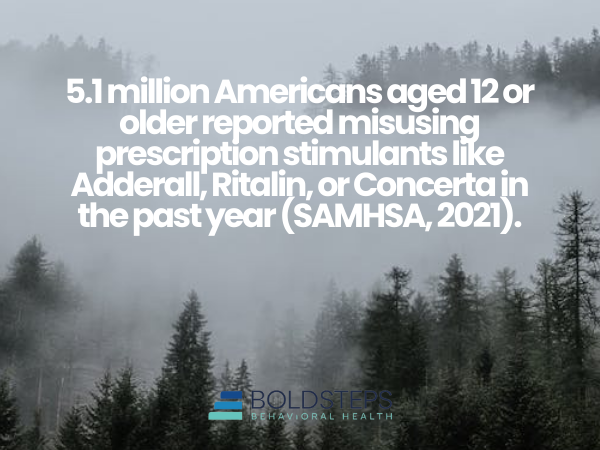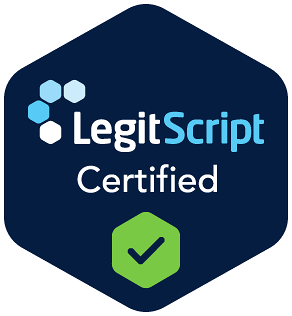Stimulants, such as cocaine, methamphetamine, and prescription medications like Adderall and Ritalin, are widely recognized for their ability to increase energy, focus, and alertness. While these substances can be beneficial when used as prescribed, their misuse can quickly lead to dependency, addiction, and severe consequences for physical, mental, and emotional health. Stimulant addiction doesn’t just impact the individual; it affects families, workplaces, and entire communities.
The journey to recovery from stimulant addiction is challenging, but it is entirely possible with a structured and comprehensive approach. At Bold Steps Behavioral Health in New Hampshire, we offer tailored recovery programs designed to address every aspect of stimulant addiction. From our Stimulants Treatment Program and Medical Detox Program to our Dual Diagnosis Treatment Program and Virtual Treatment Program, our evidence-based methods empower individuals to reclaim their lives and build a healthier future.
What is Stimulant Addiction?
Stimulants are a class of drugs that speed up communication between the brain and body. They are prescribed for conditions like ADHD and narcolepsy but are also commonly abused recreationally for their euphoric and performance-enhancing effects. Over time, misuse can lead to physical dependency, psychological addiction, and harmful health outcomes.
Common Stimulants
- Cocaine: A powerful illicit stimulant derived from coca plants.
- Methamphetamine: A highly addictive stimulant often manufactured illegally.
- Prescription Stimulants: Medications like Adderall, Ritalin, and Vyvanse, prescribed for ADHD and narcolepsy but commonly misused.
How Stimulant Addiction Develops
Stimulants work by flooding the brain with dopamine, the neurotransmitter responsible for feelings of pleasure and reward. Over time, the brain becomes reliant on these surges, making it difficult to function without the drug. This dependency drives individuals to seek higher doses more frequently, escalating into addiction.
Signs of Stimulant Addiction
Recognizing stimulant addiction is crucial for early intervention. Symptoms can vary depending on the type of stimulant and the severity of misuse.
Physical Symptoms
- Rapid weight loss due to suppressed appetite.
- Increased heart rate, high blood pressure, and other cardiovascular issues.
- Persistent insomnia or erratic sleep patterns.
- Teeth grinding, jaw clenching, or “meth mouth” in methamphetamine users.
- Physical exhaustion during withdrawal periods.
Behavioral Symptoms
- Compulsive drug-seeking behavior despite harmful consequences.
- Neglecting responsibilities at work, school, or home.
- Isolating from family or friends and associating with new groups involved in drug use.
- Financial difficulties from spending excessive money on drugs.
Psychological Symptoms
- Intense mood swings, irritability, or aggression.
- Anxiety, paranoia, or hallucinations.
- Severe depression, especially during withdrawal periods.
- Poor memory and impaired decision-making abilities.
The Risks of Stimulant Addiction
Stimulant addiction has serious short- and long-term consequences that affect multiple areas of life.
1. Physical Health Risks
- Cardiovascular Complications: Chronic stimulant use increases the risk of heart attacks, strokes, and arrhythmias.
- Neurological Damage: Prolonged use can impair cognitive function and lead to memory problems or seizures.
- Weakened Immune System: Addiction leaves the body more vulnerable to infections and illnesses.
2. Mental Health Risks
- Mood Disorders: Chronic use depletes dopamine and serotonin levels, leading to anxiety, depression, and emotional instability.
- Psychosis: High doses or prolonged use can cause hallucinations, delusions, or paranoia.
- Suicidal Thoughts: Withdrawal symptoms and untreated depression significantly increase the risk of self-harm.
3. Social and Lifestyle Consequences
- Strained Relationships: Addiction often leads to conflicts with family and friends, creating emotional distance and mistrust.
- Legal and Financial Issues: Drug possession or distribution can result in criminal charges, while addiction-related expenses can lead to financial instability.
- Career Challenges: Impaired performance, absenteeism, or workplace incidents can jeopardize employment.
The Road to Recovery
While stimulant addiction is a complex condition, recovery is achievable through a combination of medical care, therapy, and ongoing support. At Bold Steps Behavioral Health, we believe in a holistic approach that addresses every aspect of addiction to ensure lasting sobriety.
1. Medical Detox: The First Step
Detoxification is the process of clearing the body of harmful substances. Stimulant detox is typically not life-threatening, but it can be physically and emotionally challenging. Withdrawal symptoms include:
- Extreme fatigue and lethargy.
- Intense cravings for stimulants.
- Depression, irritability, and anxiety.
- Difficulty concentrating or thinking clearly.
Medical Detox at Bold Steps
Our Medical Detox Program provides:
- 24/7 Medical Supervision: Ensures a safe and comfortable withdrawal process.
- Medication Support: Prescribed medications can ease symptoms of anxiety, depression, or sleep disturbances during detox.
- Emotional Stabilization: Counseling support is available to help individuals manage the psychological challenges of detox.
2. Comprehensive Treatment Programs
After detox, individuals transition into structured treatment programs that address the root causes of addiction, develop healthy coping mechanisms, and prevent relapse.
Partial Hospitalization Program (PHP)
- Combines intensive therapy, group counseling, and medical care in a structured daytime environment.
- Ideal for individuals requiring significant support but who can return home in the evenings.
Intensive Outpatient Programs (IOP)
- Offers flexible treatment that allows individuals to continue working or attending school.
- Provides therapy sessions multiple times a week focused on relapse prevention, emotional regulation, and skill-building.
Outpatient Treatment Program
- Offers ongoing therapy and counseling for individuals in the later stages of recovery.
- Focuses on sustaining sobriety and addressing life challenges as they arise.
Virtual Treatment Program
- Provides convenient, online access to therapy and counseling for those unable to attend in person.
- Ensures the same high-quality care as in-person programs, promoting accessibility and flexibility.
3. Dual Diagnosis Treatment
Many individuals with stimulant addiction also struggle with mental health conditions like anxiety, depression, or PTSD. These co-occurring disorders require simultaneous treatment to ensure comprehensive recovery.
What is Dual Diagnosis Treatment?
Dual diagnosis treatment addresses both addiction and mental health disorders through:
- Cognitive Behavioral Therapy (CBT): Helps individuals identify and change negative thought patterns that drive addiction.
- Dialectical Behavior Therapy (DBT): Focuses on emotional regulation and stress management.
- Trauma-Informed Care: Addresses unresolved trauma that may contribute to addiction.
Our Dual Diagnosis Treatment Program is designed to treat the whole person, not just the symptoms of addiction.
4. Behavioral Health Support
Recovery involves more than just abstinence—it’s about rebuilding a fulfilling life. Our Behavioral Health Treatment in New Hampshire includes:
- Individual Therapy: Provides a safe space to explore personal challenges and recovery goals.
- Group Therapy: Encourages peer support and accountability.
- Family Therapy: Rebuilds trust and improves communication within families.
- Holistic Approaches: Incorporates mindfulness, meditation, and physical activity to promote emotional and physical well-being.
5. Relapse Prevention and Aftercare
Recovery is an ongoing journey, and relapse prevention is a critical component of long-term success. At Bold Steps, we help individuals:
- Identify personal triggers and develop coping strategies.
- Build a support network through peer groups and community resources.
- Create personalized aftercare plans to maintain sobriety and handle future challenges.
Why Choose Bold Steps Behavioral Health?
At Bold Steps Behavioral Health, we are committed to helping individuals heal from stimulant addiction with evidence-based care and compassionate support. Here’s what sets us apart:
1. Personalized Treatment Plans
We tailor our programs to meet each individual’s unique needs and goals.
2. Full Continuum of Care
From detox to outpatient services, we provide comprehensive support at every stage of recovery.
3. Experienced Professionals
Our licensed therapists, addiction specialists, and medical staff have years of experience treating stimulant addiction and co-occurring disorders.
4. Holistic Approach
We focus on treating the mind, body, and spirit, ensuring a well-rounded recovery experience.
5. Accessible Options
With in-person and virtual treatment programs, we make high-quality care available to everyone, regardless of location.
Conclusion
Stimulant addiction is a serious condition, but recovery is possible with the right treatment and support. At Bold Steps Behavioral Health, we offer comprehensive care that addresses the physical, emotional, and psychological aspects of addiction, empowering individuals to reclaim their lives and achieve lasting sobriety.
Take the first step today. Call us at (603) 915-4223 or visit Bold Steps Behavioral Health to learn more about our Stimulants Treatment Program, Dual Diagnosis Treatment Program, and other services. Together, we can help you heal and thrive.
FAQ on Healing from Stimulant Addiction
What is stimulant addiction?
Stimulant addiction occurs when individuals misuse substances like cocaine, methamphetamine, or prescription medications such as Adderall or Ritalin. Over time, this misuse leads to physical dependency and psychological addiction, making it difficult to function without the drug.
What are the signs of stimulant addiction?
Common signs of stimulant addiction include:
- Increased tolerance, requiring higher doses for the same effect.
- Intense cravings for stimulants.
- Mood swings, paranoia, or hallucinations.
- Neglect of responsibilities at work, school, or home.
- Financial or legal problems caused by drug use.
What are the risks of stimulant addiction?
Stimulant addiction can lead to serious physical and mental health risks, including:
- Cardiovascular issues like heart attack or stroke.
- Neurological problems such as seizures or cognitive decline.
- Anxiety, depression, and psychosis.
- Relationship and financial challenges.
Can stimulant addiction be treated?
Yes, stimulant addiction is treatable through comprehensive care that includes detox, therapy, and aftercare. Treatment programs like the Stimulants Treatment Program at Bold Steps Behavioral Health address the physical, emotional, and psychological aspects of addiction.
What is the first step in treating stimulant addiction?
The first step is detoxification to safely remove stimulants from the body. A Medical Detox Program ensures 24/7 medical supervision to manage withdrawal symptoms like fatigue, depression, and cravings.



